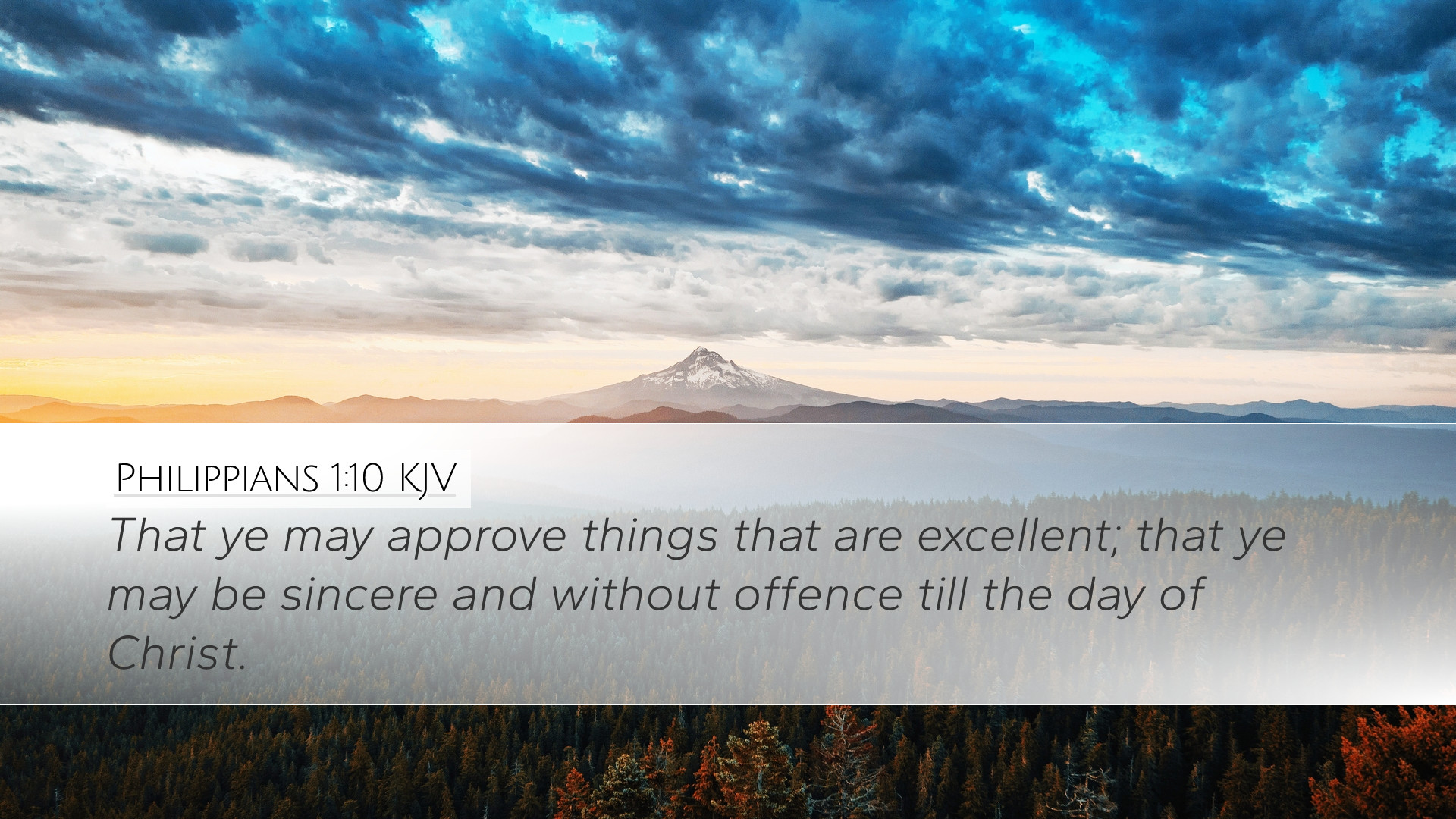Philippians 1:10 Commentary
Verse: "That ye may approve things that are excellent; that ye may be sincere and without offence till the day of Christ." (Philippians 1:10)
Introduction
The Apostle Paul, in his Epistle to the Philippians, writes to encourage and instruct the believers in their spiritual journey. In this particular verse, Philippians 1:10, Paul expresses his wish for the Philippians to engage in profound evaluation of moral and spiritual choices. By drawing from the insights of prominent public domain commentaries, we will delve into the depth of this exhortation.
Understanding "Approve Things That Are Excellent"
Paul's desire for the Philippians to "approve things that are excellent" speaks to the importance of discernment in the life of the believer.
- Matthew Henry: Henry emphasizes that the believer must not only understand what is good but must attain a depth of insight to recognize what is excellent. This involves a commitment to growth in wisdom and knowledge toward spiritual maturity.
- Albert Barnes: Barnes interprets this as a call to evaluate everything by the standard of Christ. He argues that "excellent" refers to that which is most valuable and pleasing to God, urging believers to seek excellence in all they do.
- Adam Clarke: Clarke notes that this approval goes beyond mere intellectual assent; it requires active engagement and practice. He highlights that believers should distinguish between temporary and eternal values.
Sincerity and Without Offense
Paul pairs the call for excellence with a desire for sincerity, saying that they may be "sincere and without offense." This indicates a life lived in purity and integrity.
- Matthew Henry: Henry sheds light on the Greek term used for "sincere," which can be translated as "pure" or "without hypocrisy." He argues that true sincerity reflects a heart aligned with God's will.
- Albert Barnes: Barnes connects sincerity with the absence of offense, suggesting that believers should aim to be above reproach in their conduct. This reflects an outward manifestation of inner integrity.
- Adam Clarke: Clarke discusses the term "without offense" further, explaining that it refers to being blameless, especially in relation to conduct towards others. He stresses the importance of living in a manner that does not lead others into sin.
Until the Day of Christ
"Till the day of Christ" emphasizes the ongoing nature of spiritual growth and the anticipation of Christ’s return. This phrase anchors the previous exhortations in the reality of eschatology.
- Matthew Henry: Henry remarks that the phrase encourages believers to live with a sense of urgency and purpose, reminding them that their lives will be evaluated on that final day.
- Albert Barnes: Barnes emphasizes that the expectation of Christ’s return should motivate believers to continual growth and living in a manner reflective of their faith.
- Adam Clarke: Clarke notes that this future hope encourages perseverance in righteousness. He teaches that believers are called to live in the light of eternity, shaping their ethical decisions accordingly.
Application for Believers
This verse challenges believers to assess their lives critically and strive towards excellence in their spiritual walk.
- Discernment: Believers must cultivate the ability to discern between good, better, and best in their choices, always aiming at what pleases God.
- Sincerity: A life of sincerity demands honesty before God and man. The absence of hypocrisy is paramount in influencing others positively and glorifying God.
- Preparation for Christ’s Return: Living with the awareness of Christ's imminent return urges believers to remain active in their faith and diligent in their witness.
Conclusion
Philippians 1:10 presents a profound challenge to believers regarding excellence, sincerity, and readiness for the Day of Christ. With insights from respected commentaries, we see that this verse is not simply an ancient instruction, but a timeless call to live a life of discernment, integrity, and expectancy. As scholars and practitioners of the faith meditate on this verse, may it inspire a deeper commitment to the pursuit of holiness and righteousness.


